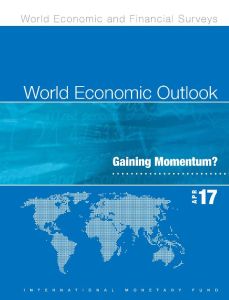Join getAbstract to access the summary!

Join getAbstract to access the summary!
International Monetary Fund
World Economic Outlook April 2017
Gaining Momentum?
IMF, 2017
What's inside?
The global economy will grow by 3.5% in 2017 and 3.6% in 2018 – if it can avoid a few big risks.
Recommendation
Global growth is slowly starting to get out of the rut it fell into following the Great Recession. The November 2016 election of Donald Trump to the United States presidency cheered global markets with expectations for tax reforms and fiscal policies that would stimulate growth. More recently, however, it appears that investigations into potential Russian interference in the US government could inflict major consequences on markets and the economy. The International Monetary Fund’s biannual report on the outlook for global growth delves into a variety of wildcards that could amplify risks, as well as policy actions that could aid growth. getAbstract recommends this comprehensive report – despite its occasional repetitiveness and rambling – to policy makers, executives, economists and investors.
Summary
About the Author
The International Monetary Fund advises member nations on policy issues and works to promote economic stability and well-being.



































Comment on this summary